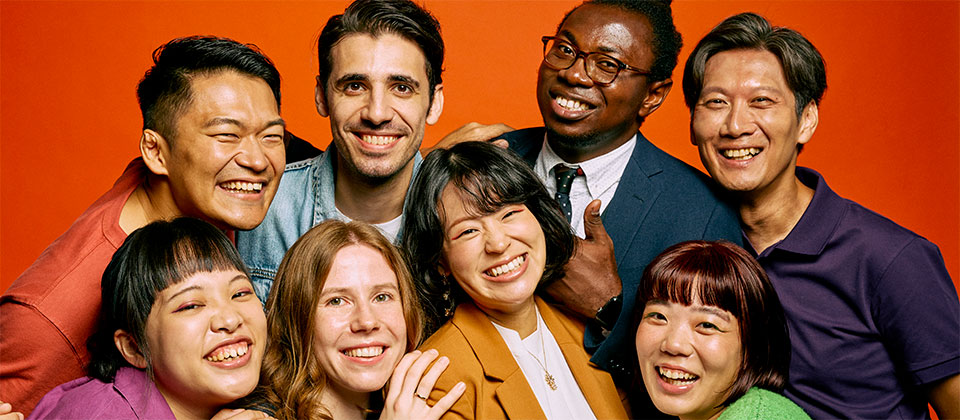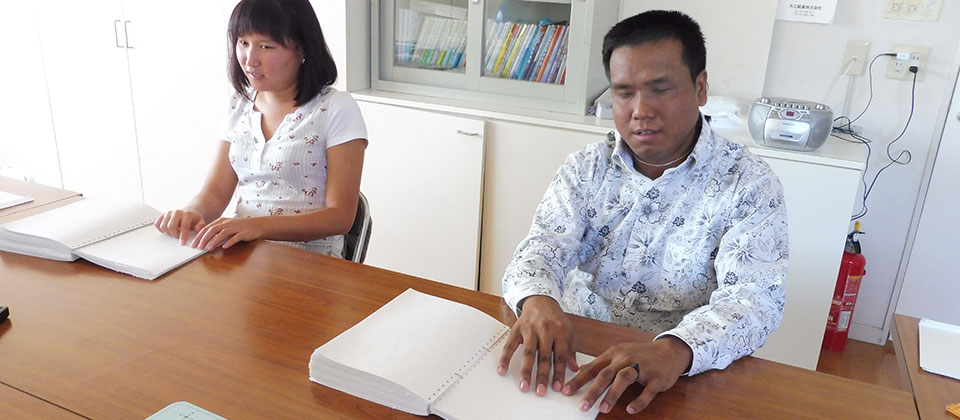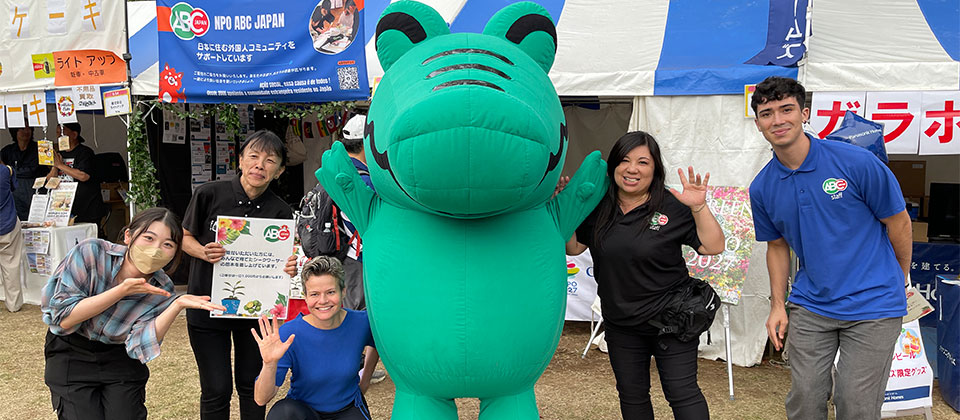The Japan Foundation Prizes for Global Citizenship (2023)
Awardees (in geographical order)
WELgee
- Representative
- Executive Director Sayaka Kankolongo Watanabe
- Year of Establishment
- 2016
- Website
- https://www.welgee.jp/
- Social Media Accounts
- https://www.facebook.com/welgee/
- https://twitter.com/WELgee_Japan

Outline of Activities and Message from Awardee
WELgee is an organization that began in 2016 as a result of a chance meeting between the founding members, who were then students, and young refugees. Currently, WELgee has six full-time staff and five specialist career coordinators, and carries out its activities in partnership with over 50 pro bono assistants and interns who participate in a range of ways while leveraging their experience in their principal occupations.
At the end of 2022, it was announced by the UNHCR that over 108,400,000 people worldwide had been driven from their homes as a result of conflict or persecution. Individuals with refugee backgrounds who have fled their countries seeking peace and safety also live here in Japan. These are individuals, who having escaped death and reached Japan at last, have applied for asylum and are awaiting the results. However, the probability of being recognized as a refugee in Japan is 2% (as of 2022). If asylum is not granted, they will lose their visa status in Japan, lose their work permits, and conceivably could also be detained. They must live in a state of suspension for a period of years while they await the outcome of their applications, but what we discovered through our conversations with them is that there are a large number of individuals with backgrounds as refugees who are keen to utilize in Japanese society the experience and expertise they accumulated in their home countries. If they are able to achieve full-time work at a company in way that capitalizes on their expertise or their experience up to now, it becomes possible to change from the unstable legal status that they face while applying for asylum to work-related residency status. As a result of doing so it becomes possible for them to live in circumstances of economic, social and legal stability and rebuild their lives with “work” as the means.
WELgee proposes and practices this as one option in Japan, the country these refugees have made their way to.
WELgee runs WELgee Talents, a human resources coordination service that capitalizes on the strengths of each and every refugee in promoting diversity, innovation generation and business development at Japanese companies; a Training Program that provides education opportunities such as career education, internships and skills development; and a Co-Creation Program that utilizes individual refugee’s skills and experience to resolve the challenges faced by various facets of Japanese society and undertakes value creation that leverages mutual strengths.
Reasons for the Prize
◆ Cultivating a society in which refugees can design their futures
NPO WELgee provides a Training Program based on the career and lifestyle goals of refugees who arrive in Japan, and undertakes activities that target a Japan in which anyone can envisage a future through career matching with companies that are recruiting, post-employment mentoring and support. Thus far it has provided peer support for more than 400 refugees, and 20 are working in jobs that utilize their specialties. WELgee’s activities do not stop at employment support – it is also tackling new challenges such as promoting refugees’ career advancement and international understanding through partnered training with companies where people with backgrounds as refugees serve as instructors, and round-table discussions on SDGs. And WELgee’s approach does not stop with refugee support – it also has significant implications in areas such as assisting foreigners living in Japan and activities for promoting international understanding.
Comments from the Awardee
It may be that the “refugee issue” feels like a specialized realm that only the United Nations, the governments of various countries, lawyers and aid groups can become involved with. However, in reality it is possible for society’s existing members to greatly increase refugees’ lifestyle options by providing them with points where they can intersect with society and then jointly generate new value. We will be delighted if receiving this award serves as an opportunity to make people newly aware of the existence of refugees persevering in Japan, and WELgee’s activities.
International Association for the Visually Impaired (IAVI)
- Representative
- Chief Director Hiroaki Ishiwata
- Year of Establishment
- 1971
- Website
- https://iavi.jp/

Outline of Activities and Message from Awardee
The International Association for the Visually Impaired (IAVI) is an organization that supports the study in Japan of visually impaired individuals from Asia, Africa and Latin America who are underprivileged in terms of opportunities for education and employment.
IAVI was founded in 1971 with the goal of having these individuals study “sanryo” (the “three treatments” of acupuncture, moxibustion and massage) for a three-year period, mainly at schools for the visually impaired, so that upon returning to their home countries they can not only achieve independence and social participation but also perform a role as leaders of the visually impaired on the basis of the knowledge and skills they have learned in Japan, and the welfare for the disabled and welfare services that they have experienced in Japanese society.
Consequently, for a period of six months prior to entering the schools for the visually impaired the participants undertake preparatory training at an office and training facility in Itabashi, including studying the Japanese language and Japanese braille, practicing walking using a white cane and residential-type training for daily living. Even after participants enter the schools for the visually impaired, IAVI undertakes a variety of backup support to ensure they enjoy their time studying in Japan and that everything goes well for them. Such support includes helping with various paperwork such as visa changes or extensions and escorting them for that, arranging personnel or offering the participants places to stay during extended vacations when the dormitories at the schools for the visually impaired are closed, and introducing and arranging various events such as New Year’s parties, parties to congratulate participants who are advancing to the next grade of the course or graduating it, and networking events with local communities.
Alongside that, it is also essential to make arrangements and brush-ups in the form of exchanges with former students of the program who have returned to their home countries and exchanges between current students. As an interim intensive component of those activities, in fall 2019 the organization invited 12 former students from 19 countries and regions, and together with 16 students who were studying in Japan at that time, they held the “International Convention of Students With White Canes” and undertook information sharing and exchanges.
As a result, it was not only possible to strengthen mutual ties, but it also meant a proposal by a former student from Taiwan for Japan and Taiwan to present visually impaired people in Kenya with white canes reached fruition. IAVI continues steadily with its activities today, despite the abolishment of a Ministry of Education, Culture, Sports, Science and Technology grant and the temporary suspension of its program as a result of the COVID-19 pandemic.
Reasons for the Prize
Supporting young visually impaired people to study at Japan’s schools for the visually impaired.
The International Association for the Visually Impaired (IAVI) invites visually impaired young people to Japan from developing countries in Asia and elsewhere, and through support for their study at schools for the visually impaired, continues to implement activities that assist these young people in acquiring occupational skills in massage, acupuncture and moxibustion. In the 52 years since its founding IAVI has accepted 89 students from 19 countries and regions to study in Japan, and along with providing opportunities that open up futures for visually impaired people in countries where independence and social participation would otherwise be difficult, it has also been contributing to promoting understanding about developing countries’ visually impaired.
In some cases when the students have returned home, they have gone on to become the chairs of their countries’ associations for the visually impaired or leaders of their countries’ welfare for the disabled. The IAVI continues to support the independence and social participation of young visually disabled people.
Comments from the Awardee
The IAVI had nominated itself for this award any number of times up to now but had always failed to win, so we are genuinely delighted that we were able to be selected this time. We sincerely thank all of those involved. Above all else, along with sharing our delight with the former students who have achieved independence and social participation based on their experience in Japan and who are serving as bridge-builders with Japan, as well as the IAVI staff members and volunteers who have supported the Association thus far, we are also determined to use the winning of this award as a major step in advancing the Association. Thank you very much.
ABC Japan
- Representative
- President Michie Afuso
- Year of Establishment
- 2000
- Website
- https://www.abcjapan.org/
- Social Media Accounts
- https://www.facebook.com/ABCJapan
- https://twitter.com/abc_info

Outline of Activities and Message from Awardee
ABC Japan is an organization that was established in 2000, centering on Brazilians of Japanese descent living in Yokohama City’s Tsurumi Ward. The organization was set up based on these individuals’ desire to resolve the many challenges they encountered while working, raising children and living in Japan. Initially it mainly focused on supporting people from South America living in the vicinity of Tsurumi Ward, but the scope of its activities has now widened to include foreigners as a whole.
ABC Japan carries out a range of projects, with the main pillars being “access to education,” “support for adults,” “community development” and “psychological support.” As a place of learning for children with ties to foreign countries, whose educational opportunities tend to be limited due to the language barrier, ABC Japan offers a free school, an after-school learning support classroom, career support and guidance counselling. It offers Japanese language and qualification upskilling courses for adults, and psychological counselling by professionals. It is also involved with activities that connect to the next generations so that young people are able to choose their paths while discovering their own roots.
Our strength is that we are strongly connected to the local community as foreigners ourselves. We have created a framework that is easily accessible to foreign residents and have consistently responded to their detailed needs. Our motto is to listen to the voices in our community while always helping out those who are struggling, and as a result of continuing to pursue activities on that basis the organization’s scope has been steadily widening. We have provided support to regions damaged during disasters, and we ran food pantries for families that were struggling economically during the COVID-19 pandemic.
Through its activities thus far, ABC Japan has become a leader of the Brazilian community in Japan’s nationwide network, and has also built relationships with the Embassy of Brazil in Tokyo and the Consulate-General of Brazil in Tokyo. Furthermore, regionally it undertakes activities with administrations, boards of education and other support groups in Kanagawa Prefecture, Yokohama City, Tsurumi Ward and elsewhere. We also cooperate with schools and universities in the area and are engaging in providing comprehensive support for children and families with links to other countries.
Going forward also, we will undertake activities that enable foreign residents living in Japan to lead independent and rich lives, and which create a society that is comfortable to live in for both Japanese and foreigners alike.
Reasons for the Prize
Providing peer support as foreigners themselves and building an open relationship with the community as “Tsurumi residents”.
ABC Japan was set up by Brazilians of Japanese descent themselves, and with a focus on Tsurumi Ward in Kanagawa Prefecture it has undertaken broad-ranging support that draws close to the lives of local foreign residents in areas such as education, education advancement and employment. Additionally, it provides opportunities for children to study and access the cultures of the countries where their ancestry lies, and supports them so they become emboldened with pride. Graduates who have grown up in this environment are beginning to flourish as leaders in contemporary society. The organization collaborates with schools and administrations on various projects and has built up an open relationship with its community that is underpinned by the common dominator of “residents (Tsurumi residents) living in Tsurumi together.” The engagement by the organization, in which foreigners living in Japan are themselves proactive within their community, is something that transcends the conventional relationship of “Japanese people supporting foreigners” and promises to serve as model for other communities going forward.
Comments from the Awardee
We are thankful to be presented with this superb award. This award recognizes the support activities for foreigners that all of us at ABC Japan have been undertaking over the past 23 years, and boosts our motivation to continue contributing to the coexistence of foreign residents and Japanese residents. In order to continue with the initiatives that we have been pursuing thus far, we intend to support and have faith in the younger generation, and along with our expertise, convey the importance of educational support for children with ties to other countries.
- What We Do Top
- Arts and Cultural Exchange [Culture]
-
Japanese-Language Education Overseas [Language]
- Japanese-Language Education Overseas [Language] Top
- Learn Japanese-language
- Teach Japanese-language
- Take Japanese-Language Test
- Know about Japanese-language education abroad
- The Japanese-Language Institute, Urawa
- The Japanese-Language Institute, Kansai
- Japanese-Language Programs for Foreign Specified Skilled Worker Candidates
- Japanese Language Education for Japanese Children Resident Overseas and for the Descendants of Migrants
- Archives
- Japanese Studies and Global Partnerships [Dialogue]
- JF digital collection
- Other Programs / Programs to Commemorate Exchange Year
- Awards and Prizes
- Publications
